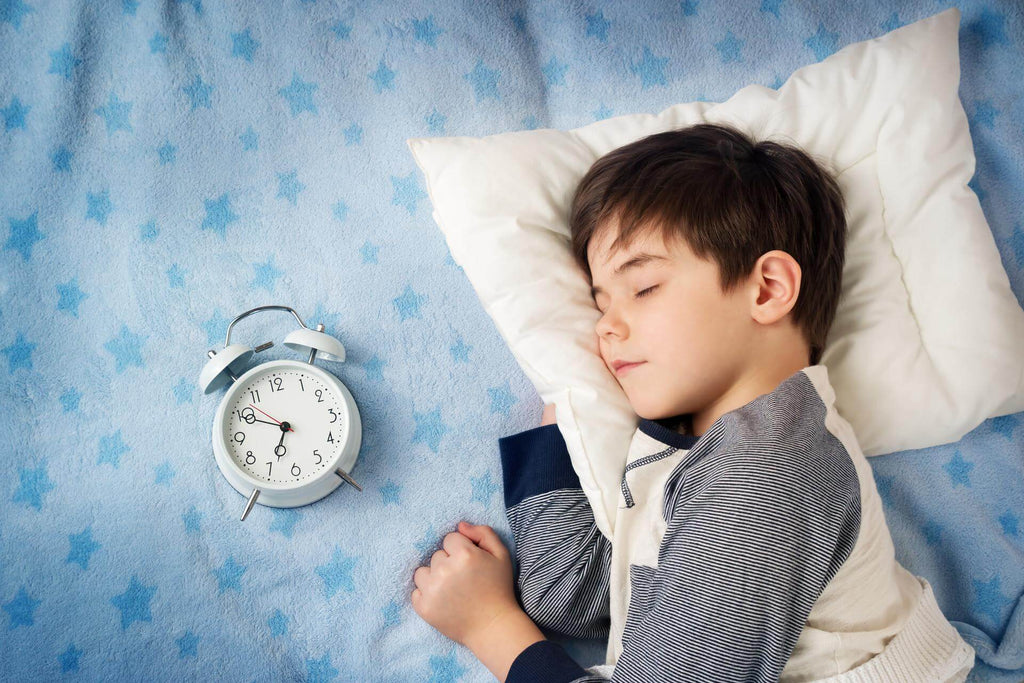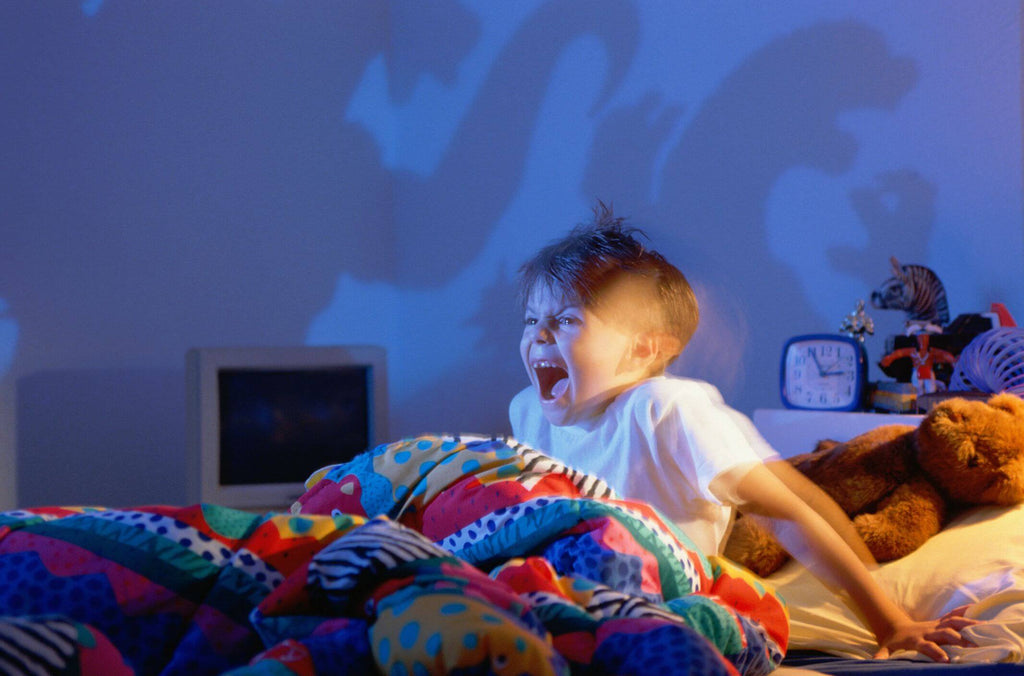Children are often told they should get eight hours of sleep each night but are that the correct number? Or should my child sleep more or less?
Many pieces of research have shown the direct correlation between sleep and your well-being. When it comes to children, the matter becomes more sensitive as their sleeping habits affect their mental and physical growth.
While school-going children aged between 5 to 12 years should sleep between 9 to 12 hours. Children above 12 can manage with up to 8 hours of sleep.
Sleep deprivation in children is related to concentration difficulties, dropped school performance, and lower test scores. Poor sleep also induces improper or insufficient eating habits.
In this blog post, we will discuss how much sleep children need. To ease the process, we have categorized the children according to their age group in four sections as below:
Infants (0 To 4 Months Old)
Babies usually sleep about 14 -18 hours a day, although some may sleep less. They generally sleep 3 to 4 hours at a stretch, and this cycle repeats after every 2 hours.
They wake up even during the night for a feed, which is normal. Their body clock starts adjusting after 3 months, and they sleep for long stretches during the night and awake more during the day.
Babies also need the right cues to fall asleep in their comfort. Say, if the baby develops a habit of sleeping in its cot.
Over time, the child will understand that the cot is the place to sleep. Gradually, you can anticipate the sleep schedule of your babies once their biological clock starts adjusting to the environment.
But every child's sleep hygiene schedule is different. Some babies sleep more during the day, while some sleep well at night. Although you cannot change their sleeping habits overnight, you can always promote healthy infant sleep habits.
Stirring at night is shared among the babies. Give them some time to settle before going to them. Here are some of the tips for a healthy bedtime routine for infants:
- Make your baby sleep over their back on a flat surface or a crib when drowsy.
- Cuddling and rocking your baby to soothe is OK. It is a myth that your baby will be spoiled if you hold him for a long time.
- Napping is an excellent way to soothe your baby. An overtired baby is not able to sleep correctly and remains irritated. If you keep your baby awake during the day, it will not help him sleep. Naps during the day benefit the baby to sleep better during the night.

Babies (4 To 12 Months)
By the age of 4 months, most babies take 3 naps a day and sleep an average of 12-14 hours a day. At 6 months, they take naps for as little as 20 minutes to 3 hours or even more. Any baby sleeping less or more is entirely normal.
They usually take a nap during the morning, afternoon and evening. However, every baby has different napping needs.
Never put your baby to sleep with a feeding bottle in its mouth. It may lead to tooth decay. Try to maintain a sleep schedule to help your baby with proper sleep. Here are some of the tips for a healthy bedtime schedule for infants:
After 6 months, if the baby wakes up at night and cries, check out what is wrong without taking them out of the crib. Check if they are feeling too hot or cold. You may convert them by stroking over their head and allowing them to self-soothe.
Toddlers (1-2 Years)
Most toddlers sleep for 10-12 hours a day. They have a very active day and need lots of energy. So they need to sleep longer at night.
Healthy sleep habits for Toddlers:
- It might still be a struggle for some parents to stick to a sleep schedule for their toddlers. However, it is still important to stick to the plans as this is crucial for developing their sleeping pattern.
- You can try some soothing music to comfort them.
- Avoid naps later in the day as it may adversely affect their sleep.
- Keep their bedroom cosy and quiet with dim lights to maintain a peaceful sleeping environment.
- You can help them with storytime or other quiet activities before bed.
Children (3 To 5 Years Old)
The child starts going to their preschool at this age. They have a hectic day and need a long peaceful sleep during the night and a 2-3 hour nap once they return from school.
Some children may not need a nap, but sleeping for 10-11 hours at night is typical.
Children usually resist going to bed on time at this age.
Here are some healthy sleep habits for preschoolers:
- Keep snug bed arrangements for your child to raise a sense of security among them.
- Avoid screen time before bed as it will induce a sense of awakeness in them, and they will resist more to go to bed.
- Avoid any caffeine intake as it interferes with their peaceful sleep.
- It is expected that the children will try to delay their sleep time. Keep patience and reward them for sticking to the right sleep time.
- Take their bedtime fears and nightmares seriously and comfort them with a soothing bedroom ambience.

Children (6-12 Years)
Most children by this age have a steady bedtime schedule which they have followed since their early years.
The extended school days refrain them from taking naps during the day. However, allow your child to rest and unwind for 1-2 hours after lunch.
Healthy Sleeping habits for Children between 6-12 hours:
- Limit screen time as it may distract them from sleeping on time.
- Set their homework schedules to avoid any late-night studies. They will be sleep-deprived the next day. It will turn into a vicious circle as if they will sleep late.
- Children at this age also encounter nightmares. Hence, it becomes essential to maintain a cosy bedroom to have a peaceful sleep.
What Are Some Of The Common Sleep Problems?
Nightmares are a common issue that many children face. It is the result of any emotional event or excessive physical tiredness.
Many children start crying or shout aloud to call you for comfort. Reassuring and cuddling your child can help. Be attentive to their calls and calm them for a soothing sleep. Bed urination is also expected due to these nightmares.
If you notice your child being cranky and fussy all the time, the most probable cause is sleep deprivation.
It reflects that they are not getting enough sleep or a rejuvenating nap during the day. Keep an eye on their sleeping schedule to assess how long to sleep in a 24-H day to understand if they are going through sleep deprivation.
As toddlers and infants are close to their mothers, they always look for intimate cuddling to soothe themselves.
Extended separation during your working hours can make them uncomfortable and restless. It affects their sleep pattern negatively. You can use a soft toy or pillow to give them a sense of security once they fall asleep. It will help them in getting a calming sleep.
What If My Child Is Not Able To Sleep Properly?
Many children lie for long hours but struggle to sleep. It could be due to the intake of caffeine/ soda, excessive screen time, or having energy drinks before bedtime. Here are some of the remedies that help children sleep peacefully:
- Reading, calming music, and talking to your child at bedtime are some claimed activities that may help your child sleep properly.
- Never allow your child to take caffeine or energy drink before bedtime.
- Limit their screen time strictly. Please do not allow them to watch TV or play video games, as it alerts their mind and does not allow them to sleep peacefully.

Healthy Sleep Habits That You Should Adopt As A Family
The American Academy of Pediatrics (AAP) suggests that the family adopt the proper sleep habit. Not only for kids, but adequate sleep is also vital for adults and their well-being.
Avoid Sleeping During The Day.
Engage your kids in exciting activities during the day to only sleep a little. Sleeping during the day will disturb their sleeping schedules during the night. Although, you should allow them to rest well during the day to rejuvenate them once they return home from school.
Create A Safe-Bedroom Environment.
Provisions like dim light during night time, the kids' room to be in proximity to your room, better temperature control, etc., create a safe and peaceful environment for the tired to catch up with proper sleep.
To ease their separation anxiety and let them sleep alone, you can arrange for their favourite doll or teddy to take along while sleeping.
Restrict The Screen Time.
Keep all the gadgets, like laptops, TV, phones, tablets, etc., out of the kids' room to prevent sleep disruption. There should be a gap of at least 2 hours between their sleep and screen time. It helps in calming their mind and induces them to sleep better.
Avoid Overscheduling
Besides homework, there are several activities nowadays that most parents are interested in getting their kids admitted to. Sports, music, abacus, mental mathematics, and several other skills are popular among kids nowadays.
But it also leads to hectic schedules that pose challenges in getting good sleep for children. Your children need downtime among the programs to unwind themselves.
Never Put Your Baby With Juice, Milk Or Other Drink On The Bed.
Parents often adopt a habit of feeding their children with a milk bottle while putting them to sleep on their beds. They are unaware that it leads to tooth decay and should be strictly avoided.
Teens Need More Sleep.
Schools and parents should work together to ensure that teenagers get enough sleep. Schools often call up older kids earlier to manage their higher studies burden.
However, AAP suggests that high- and middle-class students should delay school timings to 8:30 AM to avoid any sleep deprivation.
Avoid Solid Food Before 6 Months Of Age.
Many believe that starting solid food at the age 0f 4-5 months helps the baby sleep early. However, it is tough for a baby under 6 to digest solid food. It may worsen the situation, and they may encounter a stomach ache.
Maintaining Consistent Daily Schedules.
From meal times to nap times and activity times, it is essential to maintain a consistent schedule so that your child's biological clock can adjust to it. Start with an early bedtime for younger children to keep this habit in their growing years.
Recognize Sleep Disorders.
Stalling, nighttime awakenings, snoring, sleep apnea, heavy breathing, etc., are some common issues that lead to sleep disorders in your child.
Early-stage identification of this disorder helps in avoiding sleep deprivation in your child. Talk to a paediatrician if your child experiences any such sleep disorder.
FAQs
Now that you know all about the amount of sleep children need, let's take a look at a few frequently asked questions.
Is 7 Hours Enough Sleep For A Kid?
The amount of sleep children need depends on their age. For a 1 to 2 year old, 11-12.5 hours of sleep per night is sufficient, whereas, a 6 to 7 years old kid needs about 10.5 hours of sleep each night.
Can A Child Sleep For 8 Hours?
While nas aren’t as necessary, experts recommend kids of all ages between 6 to 12 years to get a good night’s sleep of about 9 to 12 hours every night.
How Does Sleep Affect A Child’s Growth?
Where the effects of sufficient sleep on a child’s growth remain unknown, sleep deprivation has been found to hinder a child’s growth by larger extents. That’s because lack of sleep, more likely known as sleep deprivation, directly reduces the production of the growth hormone.
Wrap Up!
Although the sleeping pattern varies from child to child, every child needs proper sleep for their mental and physical well-being. Maintaining the appropriate sleeping schedules for your child from an early age is necessary.
Sleep deprivation adversely affects the cognitive skill of your child and can also hamper overall growth. Early signs of sleep deprivation should be taken seriously. Do not hesitate to consult a doctor or paediatrician to get the right solution.
Furthermore, experts suggest that the quality of the mattress we sleep on immensely affects our sleep. Therefore, if you want your child to get the sleep they need in these crucial areas, then you have come to the right place. Make sure to visit Crafted Beds and get your hands on the best mattresses to ensure quality sleep!
 BLACK FRIDAY SALE LIVE NOW 15% OFF EVERYTHING USE CODE: BF15
BLACK FRIDAY SALE LIVE NOW 15% OFF EVERYTHING USE CODE: BF15






